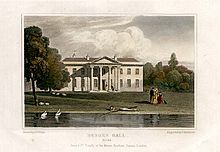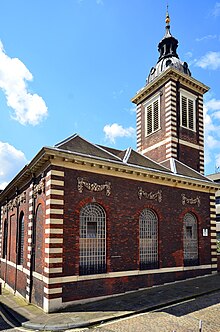Richard Muilman Trench Chiswell (baptised 23 March 1734 – 3 February 1797) was an English banker, antiquarian and MP. He committed suicide after his bankruptcy.
Life


Richard Muilman was born as the son of the Dutch merchant/banker Peter Muilman (Amsterdam, 10 December 1706-Marylebone, 4 February 1790) who settled in Bishopsgate in 1722, close to London’s Dutch Church, the remaining fragment of Austin Friars. Peter Muilman married Mary Chiswell in 1734 and owned Kirby Hall, Essex near Great Yeldham.
For many years his father and uncle Henry cooperated with their brothers, bankers in Amsterdam. They traded on Denmark, Russia, Dutch Guiana and the Caribbean. In 1757 Richard joined the Muilman company, which cooperated with the Clifford family in speculating on the rise of EIC-stocks and in the circulation of bills of exchange but the Cliffords were hit by the credit crisis of 1772.
Richard assumed the extra surnames of Trench and Chiswell by royal licence on 28 November 1772 after the death of his mother's brother, Richard Chiswell, when he inherited a fortune of £120,000 (£23.8 million as of 2024) and Debden Hall in Essex. He was appointed High Sheriff of Essex for 1776. Chiswell made some literary collections relating to the history of Essex, and he was elected a Fellow of the Society of Antiquaries in 1791. He is said to have owned some "fine Caxtons" which were accidentally burned.
He was elected MP for Aldborough, Yorkshire, in 1790, and served until his death, supporting the government of William Pitt the Younger. In 1792 he voted against the Slave Trade Bill. His mind became deranged as a result of unsuccessful speculations in the West Indies in which he may have lost £450,000 (£89.4 million as of 2024). He shot himself in his country house.
Family

Keen on local history Peter Muilman supported financially the publication of A New and Complete History of Essex, From a Late Survey; Compared with the most celebrated Histories Containing, A natural and pleasing Description of the Several Divisions of the County, With Their Products and Curiosities of every Kind Both Ancient and Modern. And a Review of the most remarkable Events and Revolutions therein, from the earliest Era down to 1769 to be issued in 36 fortnightly parts. The author seems to have been Henry Dudley.
Henry Muilman (27 August 1698-4 May 1772) married a notorious courtisane Teresia Constantia Phillips in 1724. It has been speculated that the marriage was ended after her past was discovered. Muilman refused to pay her the money that had been agreed as part of the separation and a dispute began. After his divorce he married Anne Darnell in 1728. The long-running court case between Phillips and Muilman was settled in 1748.
In 1756, Richard married Mary (c1732-1807), a daughter of Dr James Jurin; he lived at Portland Place. Their only child, also Mary, married the British Resident in Venice, Sir Francis Vincent, 8th Baronet. Chiswell's first cousin, Anna Muilman, married John Julius Angerstein.
References
- England, Select Births and Christenings, 1538-1975
- Notes and Queries: A Medium of Inter-Communication for Literary Men, p. 325
- Patronage: Mercantile Sitters
- "Essex Archives Online - Catalogue: I/Mb 176/1/29".
- Deutsche Kaufleute in London: Welthandel und Einobürgerung (1660-1818) by Margrit Schulte Beerbühl, p. 370
- "MUILMAN TRENCH CHISWELL, Richard (c.1735-97), of Debden Hall, Essex". History of Parliament Online. Retrieved 28 April 2016.
- ^ Wroth 1887.
- "MUILMAN TRENCH CHISWELL, Richard (c.1735-97), of Debden Hall, Essex". History of Parliament Online. Retrieved 28 April 2016.
- English bankrupts
- Chiswell, Richard Muilman Trenchlocked (1735–1797) by John H. Appleby
- The Gentleman’s History of Essex; the enigma of its authorship resolved? by Michael Leach. In: Essex Journal, 2013 Vol.48 No.1 ISSN 0014-0961
- Lambeth Palace Library
- Emma Plaskitt, 'Phillips , Teresia Constantia (1709–1765)', Oxford Dictionary of National Biography, Oxford University Press, 2004 accessed 1 April 2015 (subscription is required)
- Mascuch, Michael (2013). The Origins of the Individualist Self. pp. 290, 293, 294, 322, 331, 332–3, 352–3, 355. ISBN 978-0745667737.
- Twist, A.F. (2002) Widening circles in finance, philanthropy and the arts. A study of the life of John Julius Angerstein 1735-1823
- Twist, A.F. (2002) Widening circles in finance, philanthropy and the arts. A study of the life of John Julius Angerstein 1735-1823
- Attribution
- Wroth, Warwick William (1887). "Chiswell, Trench" . In Stephen, Leslie (ed.). Dictionary of National Biography. Vol. 10. London: Smith, Elder & Co.
External links
| Parliament of Great Britain | ||
|---|---|---|
| Preceded byJohn Gally Knight Richard Pepper Arden |
Member of Parliament for Aldborough 1790–1797 With: John Gally Knight 1790–96 Charles Duncombe 1796-97 |
Succeeded byCharles Duncombe John Blackburn |
This article about a Member of the Parliament of Great Britain (1707–1800) representing an English constituency is a stub. You can help Misplaced Pages by expanding it. |
- 1734 births
- 1797 deaths
- People educated at Newcome's School
- Members of the Parliament of Great Britain for English constituencies
- British MPs 1790–1796
- British MPs 1796–1800
- British politicians who died by suicide
- Suicides by firearm in England
- High sheriffs of Essex
- Fellows of the Society of Antiquaries of London
- English bankers
- Great Britain MP (1707–1800) for England stubs